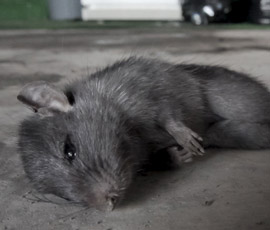Rat bait restrictions may cost farmers more

A ban on the using certain rat baits away from buildings must be reversed, the National Gamekeepers’ Organisation (NGO) has said.
The Health and Safety Executive (HSE) has imposed restrictions on the use of all difenacoum and bromadiolone-based rodenticide products.
As a result, rat baits based on these second generation chemicals will now be labelled for use only “in and around buildings”, preventing thousands of gamekeepers and pest controllers from deploying them in the wider countryside.
The HSE’s decision was prompted by a long-standing concern that residues of these products are often found in non-target species such as foxes, badgers and buzzards.
These non-target species do sometimes consume treated rats, the NGO agreed, but it insisted that the levels at which residues occur in these predators were sub-lethal.
“No-one has ever shown a welfare effect, let alone any link between the correct outdoor use of rat bait and the populations of non-target species, most of which are thriving,” said the organisation.
But the restrictions would cause massive confusion and add significant additional costs to the farming, gamekeeping and pest control industries, the NGO warned.
In a letter sent to DEFRA minister Lord de Mauley this week, NGO chairman Lindsay Waddell said the compounds were vital to proper rat control in the countryside, adding that imposing “sweeping restrictions” would have a “devastating impact”.
“Rat control in open areas will be seriously compromised, with significant adverse impacts on the food and farming industries, the environment, wildlife and not least public health.”
Lindsay Waddell
Mr Waddell wrote: “Rat control in open areas will be seriously compromised, with significant adverse impacts on the food and farming industries, the environment, wildlife and not least public health.”
He concluded its letter to the minister by asking him to “investigate immediately how this shambles has been allowed to happen and to get the restrictions lifted pending proper completion of the HSE’s review”.
The NGO believes the way forward with these products is to reduce residues in wildlife through best practice, linked to operator training.
In the meantime, gamekeepers and others following the precise on-label instructions on any product they already have will not be breaking the law.
A spokesman for the Health and Safety Executive (HSE) said: “There is no outright ban on the use of rodenticides outdoors. Second generation anti-coagulant rodenticides (SGARs) can still be used outdoors ‘in and around buildings’.
“The restrictions on these particular rodenticides need not have any negative impact on rat populations as other products and methods are available for rodent control in open areas. It is also important to be cleat that rodenticides should only form part of a broader strategy for rodent control.
“HSE recognises there is not a solution that will be entirely acceptable to everyone and is continuing to engage with stakeholders so the best way forward can be found, balancing the need to control rodents with the risks of unintended poisoning of other wildlife.”
Rat control 2: minimising risk to wildlife
Add your views to our Rats Bait forum
